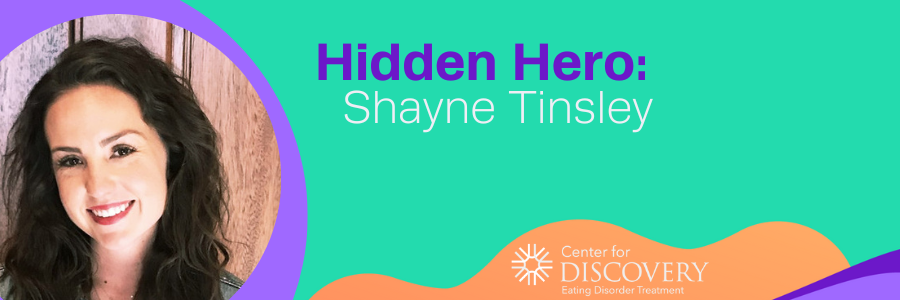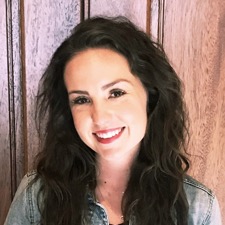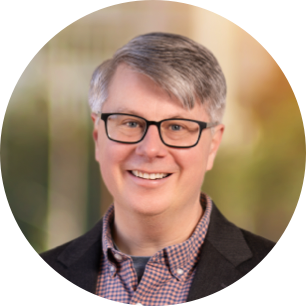Hidden Hero: Shayne Tinsley

Welcome back to our Hidden Heroes series during Eating Disorder Awareness Week. We are highlighting our unsung heroes within our clients and today we are shining the spotlight on Shayne Tinsley from Center of Discovery! Center of Discovery helps patients recover from eating disorders by using evidence-based treatments and their Real-Life Recovery™ approach.
My manager, Shayne Tinsley, is supportive, empathetic, and always validates me. She consistently goes to bat for me and is always accessible, even when she shouldn’t be. I appreciate her and it makes me love my job and Center for Discovery even more
Meghan Thomas, Operations Hiring Coordinator at Center for Discovery

Shayne has been with the Center for Discovery for 7 years, starting off as a Facility Administrator/Manager in 2016 to now being the Director of Operations of Outpatient! We got to interview Shayne about working in the eating disorder space and how rewarding the work can be.
How did you get into the behavioral health industry?
From a young age, I remember being exposed to the stigma around mental health issues and the labeling of people who sought mental health support. I recognized that how society responded to these things was a concern and needed to be changed. I wanted to be a part of that change, so it was an easy decision when choosing Psychology with an emphasis on Public health as my major of study at California State University San Marcos. I have had the honor of holding various positions in mental health treatment, further fueling my goals of ensuring the best possible services are offered and making it my mission to normalize mental health support by joining those on the front lines of behavioral health.
What is your WHY for working in behavioral health?
To break the stigma. If people require help, they should have easy access to it. If someone has an apparent injury, such as a broken arm, or was in an accident, no one questions why you are at the hospital or that you need care. If you go to the hospital because you are in a mental health crisis, no one can necessarily see what your needs are, but they should treat it just as seriously. Mental illness does not care about your race, ethnicity, veteran status, gender, sexuality, or body size. They do not have prejudices or biases like us. Like every other type of injury and illness, every person needs an individualized approach to treatment. Working with eating disorders has only strengthened my belief in this. Even though eating disorders are one of the deadliest mental health diagnoses, second only to opioid abuse, we still have patients go to the Emergency Department who are turned away because they aren’t “sick enough” or “thin enough to be sick enough”. I believe change is possible, and to do so, we must change our language and beliefs about mental health issues by changing stigmatizing language and beliefs about mental health issues by developing mental health care policies and in promoting a system in which better, more compassionate outcomes are the norm.
What was the moment you realized you love what you do?
Easy, and a moment I’ll never forget. Upon discharge, a patient expressed their gratitude for treatment and the services that were provided and went on to express that if it were not for the services, we provided that they would not be with us today. It was then it really hit me how immense it is, the work we do and the impact it has.
What are your wins or accomplishments that keep you motivated?
The biggest professional wins for me all involve supporting our teams in delivering the best possible care to our patients. From creating systems that cut down on behind-the-scenes time to increase time actually spent face-to-face with patients, to designing ways for staff to get their much-deserved appreciation, it is all about valuing frontline workers. As a Kipu system administrator, I am honored to be able to streamline our documentation process and work toward an even more efficient EMR.
What have you learned throughout your career that has impacted your personal life and how you navigate through your personal self-care?
I’ve learned that the mind and body go hand-in-hand, and you must listen and balance both before caring for others. In my professional and personal life, I have learned how to listen to my body and meet my own needs, and I strive to teach others this same concept.
We are highlighting our hidden heroes monthly! Have someone in mind? Please nominate them to be featured.
Rely on Kipu to keep you ahead of change.
Subscribe to Kipu for behavioral health news, updates, community celebration, and product announcements.




